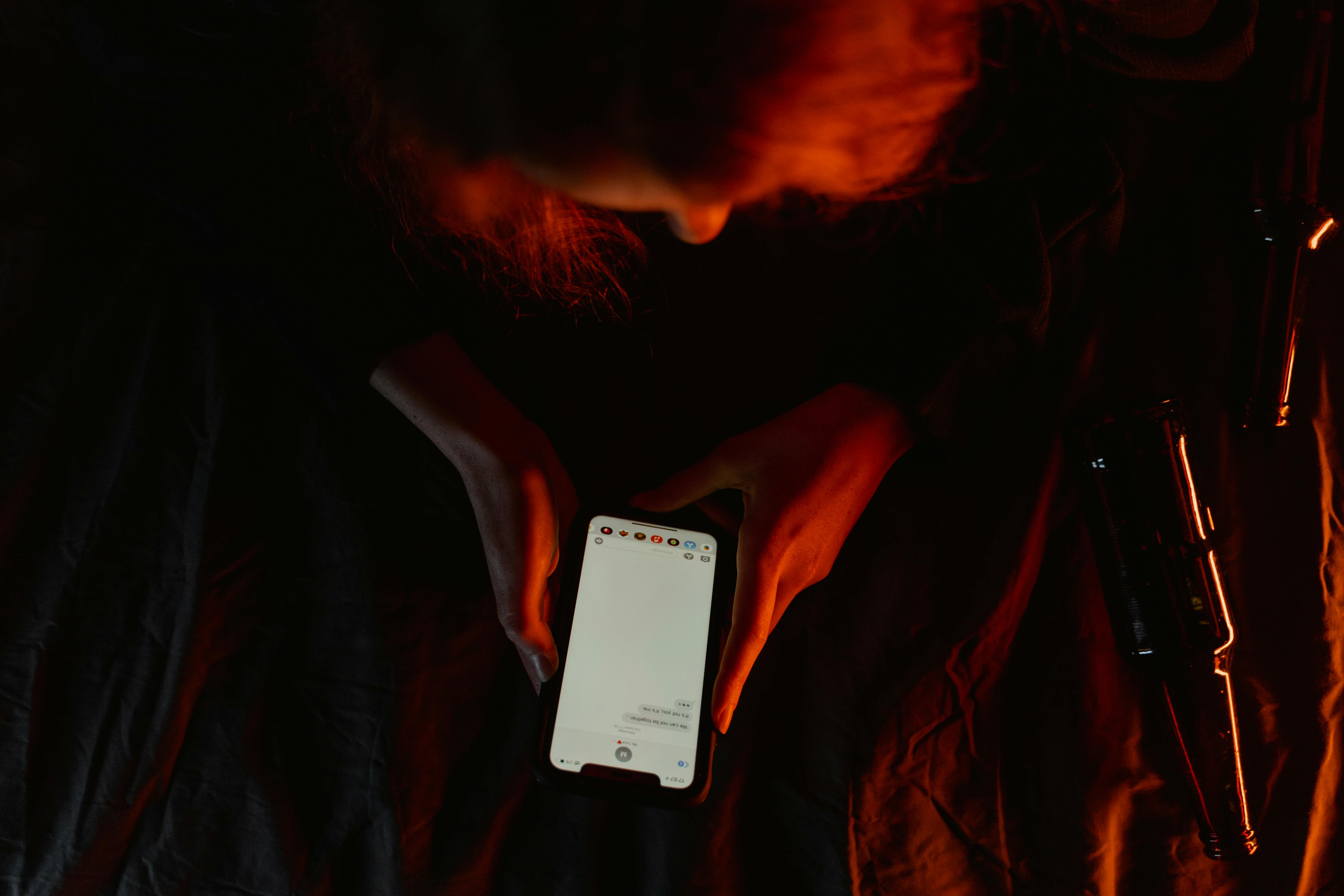"Should We Be Afraid of AI?"
Oh my gosh, I just watched that sci-fi flick "Ex Machina," and now I'm all sweaty palms about artificial intelligence! It's like we're walking on eggshells around this thing. But let me tell you, folks: we should be more afraid of our own insecurities than we are of those pesky robots.
Remember when you were little and your parents said something along the lines of "Don't talk to strangers"? Well, imagine if that advice came from a robot instead of a human. Would you still listen? Probably not!
Now, let's flip that script and consider how much we've grown to trust technology in our daily lives. From smartphones that can remember passwords and remind us of appointments to self-driving cars that promise to save us from traffic jams (or at least pretend they do), we're already living in a world where machines have taken over certain aspects of our lives.
But here's the kicker: isn't part of what makes us human the ability to think critically about technology? To question whether it's really working as well as it claims to? Isn't that exactly what we're doing with these new gadgets and systems?
And then there's the whole idea of "enhanced capabilities." Can we really afford to give up so many of our freedoms because someone else promises them to us? What happens when we start seeing ourselves less as individuals and more as mere tools for progress?
So, is it time to embrace the future of automation and artificial intelligence, or should we hold off until we've figured out how to keep them under control? Because, you know, it's not rocket science; it's just a matter of being prepared for whatever comes next.
I say, let's get ready to code some fear and excitement into the fabric of society together. After all, isn't that how innovation always starts anyway?
Action item: Think about it. Who would win in a fight between a human and a superintelligent machine? And maybe don't forget to share your thoughts in the comments below—maybe even vote for your favorite answer!
"Hello, my fellow humans! Today, we're diving into the realm of technology's most notorious nemesis: the smartphone addiction epidemic. Picture this: you're sitting in your favorite café, sipping on coffee, ready to dive into your latest tech binge. But instead of scrolling through social media or playing yet another game, you find yourself staring at your phone like a lost soul in a desert wasteland. It’s not just about how much time you spend; it's about the obsession itself—how it hijacks your life, turning every moment into a mini-episode of "Stranger Things." So here’s the question: Are you one of those people who can't live without their smartphones? Or is it more than just a habit, but a way of life?"
SEO Keywords:
smartphone addiction, digital detox, tech habits, mobile device dependency
Semantic SEO:
The title "Smartphone Addiction Epidemic" will help users quickly identify the content type they’re looking for, while "tech habits" and "digital detox" will guide search engines towards relevant pages.
Content Outline:
- Introduction: Start with a provocative quote or anecdote to grab attention.
- Body: Discuss various aspects of smartphone usage and its impact on daily life.
- Conclusion: Conclude with a call to action or thought-provoking statement.
Let me know if you need any adjustments or additional elements to make this intro compelling and SEO-friendly.
Title: The Smartphone Addiction Epidemic
Introduction
In today's fast-paced world, smartphones have become indispensable companions. They connect us seamlessly to friends, family, work, and entertainment. However, with such ubiquitous access to information and connectivity, the phenomenon of smartphone addiction has emerged as a significant concern. This article delves into the intricacies of smartphone use and its profound effects on our lives, exploring both the benefits and drawbacks.
Imagine waking up to a screen glowing bright against the darkness outside—a stark reminder of the omnipresence of smartphones. In this scenario, the question arises: How far can our reliance on these devices take us before we realize we’ve traded real-life experiences for virtual ones?
Body
The Impact on Daily Life
Smartphones have revolutionized communication, making it easier than ever to stay connected. Yet, this constant connection often leads to a decrease in face-to-face interactions, which can have detrimental effects on mental health and interpersonal relationships. Consider the classic example of someone who spends hours per day on social media, only engaging with others online rather than meeting them in person.
Moreover, the convenience of smartphones extends beyond just staying connected. With features like GPS, maps, and weather apps, they provide practical solutions to everyday problems. For instance, navigating unfamiliar territories becomes a breeze thanks to location services. However, this same functionality can also lead to escapism, where the user might feel compelled to check notifications or perform tasks despite having no immediate need to interact with the physical world.
Overcoming the Addictive Nature
Despite the undeniable benefits, smartphones remain a source of addiction for many. One of the primary reasons is the ease with which they offer instant gratification. Whether it's checking emails, browsing news, or playing games, the satisfaction derived from these activities is almost instantaneous. This immediacy can be incredibly addictive, leading users to neglect other important aspects of their lives.
Another factor contributing to smartphone addiction is the lack of accountability. Unlike traditional forms of communication, smartphone messages don’t require face-to-face interaction, making it easy to engage in behaviors that might otherwise be considered socially inappropriate. For example, someone might respond impulsively to a text message, thinking it’s okay to be rude or insensitive, simply because they didn’t have the chance to meet the recipient in person.
Strategies for Digital Detox
While acknowledging the allure of smartphones, it’s crucial to recognize the importance of maintaining a balanced lifestyle. A common solution is implementing digital detox periods. These brief moments of disconnection allow individuals
Title: Smartphone Addiction Epidemic
Hey everyone, guess what? Your smartphone addiction has officially become a global pandemic. You're probably thinking, "What's the big deal?" But hear me out. This isn’t just a minor health issue—it’s a full-blown crisis that threatens to take over your life.
Picture this scenario: you’re in the middle of a meeting, trying to stay engaged, but your phone keeps buzzing. Instead of focusing on the task at hand, you reach for it, only to realize you’ve been distracted for minutes. Sound familiar? That’s just the beginning.
The Impact on Daily Life
Now, picture this: every single moment of your day becomes a mini episode of "Stranger Things"—every text, email, notification, and glance at your screen turns into a potential distraction. Before you know it, you’re spending hours staring at your phone, wondering why you ever left home.
This isn’t just about how much time you spend; it’s about the obsession itself. It’s a way of life, a constant state of mind that leaves no room for anything else. And let me tell you, it’s exhausting.
How to Break Free
So, what’s the solution? Simple: practice tech habits. Set boundaries. Limit your screen time. Turn off notifications during important meetings. Take breaks throughout the day to disconnect.
But remember, this isn’t just about controlling your devices; it’s about reclaiming your life. Find ways to recharge outside of your phone. Engage in activities that truly interest you—read a book, play a sport, spend time with friends and family.
Conclusion
In conclusion, the smartphone addiction epidemic is real. It’s affecting not just individual lives, but entire communities. But hey, at least we’re starting to recognize it. Let’s hope we learn to conquer this before it conquers us.
Ready to break free from the grip of your smartphone? Share your thoughts in the comments below—we’d love to hear from you!
Featured Snippet:
"The Smartphone Addiction Epidemic: Is Your Phone Hijacking Your Life?" 🤯🔍
FAQs:
Q: How does smartphone addiction affect mental health?
A: It leads to stress, anxiety, and even depression. Just like how too much sugar can cause a crash, excessive screen time can leave you feeling drained and disconnected.Q: Can anyone resist the allure of their phone?
A: Not necessarily. Studies show that people who use their phones frequently tend to have higher levels of stress and lower self-esteem compared to those who limit their screen time.Q: Is there a cure for smartphone addiction?
A: The best remedy might be simple: disconnecting from devices during designated times, like before bed or after dinner. That's right, sleep and relaxation go hand-in-hand with tech-free nights.Q: How can I break free from smartphone addiction?
A: Try setting specific times for checking your phone each day. If you see it, put it away. Also, try incorporating activities that don’t involve screens, like reading books or spending time outdoors.Q: Should I invest in a fitness tracker or just track my steps?
A: Both have their pros and cons. Fitness trackers can motivate you to move more, while tracking steps alone doesn't guarantee physical activity. Find what works best for you and stick with it.Q: How often should I clean my phone?
A: Cleanliness isn't just about keeping your phone spotless—it's also about preventing viruses and bacteria buildup. Regular cleaning can extend your phone's lifespan and improve its performance.Q: Can wearing glasses improve vision?
A: Wearing glasses for nearsightedness can indeed improve your vision, making everyday tasks easier and reducing eye strain. However, sunglasses offer protection against harmful UV rays and glare, which is crucial year-round.Q: Is drinking water actually healthy?
A: Yes, drinking enough water is essential for maintaining good health. Dehydration can lead to fatigue, headaches, and poor concentration, so keep a reusable water bottle handy.Q: Do you believe in fate?
A: While we can't predict the future, believing in fate can give us a sense of purpose and direction. Whether you choose to follow a predetermined path or create yours, both paths can lead to success.
1
Title: The Smartphone Addiction Epidemic
Hey there, tech enthusiasts! Ever felt like your phone is controlling your very existence? That feeling might sound extreme, but let me tell you, it's real. Imagine if your phone could read your mind—or rather, your brain—and dictate your actions without a second thought. Now, picture that same scenario played out across millions of minds. That's kind of what we're dealing with right now.
Think back to the last time you had a solid night's sleep. Wasn’t it the phone buzzing in your pocket that woke you up? Or maybe it was the endless notifications blaring away, keeping you awake long after bedtime. These aren't just annoying interruptions; they're tiny dragons stealing precious moments from your restful slumber.
But wait, there's more. Did you ever feel like you were missing out on important events because you couldn’t resist checking your phone? Remember, those moments spent glued to your screen aren't just wasted seconds—they're potential memories forever lost to the ether. You might as well be watching paint dry.
And speaking of paint drying... Have you noticed how often you find yourself reaching for your phone during meals? How about meetings? Even bathroom breaks? It’s like everyone has become addicted to the instant gratification provided by their devices. And guess what? They’re making us all fat, dumb, and lazy in the process.
So, am I saying we should throw our phones into a lake and never look back? Not quite. But perhaps it’s time we took a step back and considered whether we truly understand why we love our phones so much. Could it be that our addiction stems from deeper psychological needs? Like needing constant validation, belonging, or simply wanting to belong?
Here’s the big question: Do you want to be part of the solution or the problem? If you’re reading this and thinking, “That’s great, but how do I stop?” I’ve got news for you: the road to recovery is paved with apps, meditation, and self-awareness. But first things first: admit you have a problem.
So, here’s the call to action: Let’s break free from the chains of our phones once and for all. Start small—turn off notifications, set aside specific times to check your phone, and focus on activities that don’t involve screens. Over time, you’ll notice improvements in productivity, relationships, and overall quality of life.
In conclusion, smartphones may seem harmless enough, but they’re slowly eroding the essence of what
Title: The Smartphone Addiction Epidemic
In today's fast-paced world, we’ve reached a point where smartphones have become more than just devices; they've morphed into extensions of ourselves, forever tethering us to the virtual reality. Imagine trying to navigate life without a smartphone—the equivalent of attempting to survive without a compass or map. That’s essentially what we’re doing with our phones—it’s a constant presence, always within reach, guiding us through each day like an invisible hand.
But why do we let it happen? Why do we fall so deeply in love with our phones? It’s easy to blame the technology, but perhaps we’re to blame too. In our quest for convenience and connectivity, we’ve forgotten the importance of disconnecting, of stepping away from the screen to engage with the real world. It’s a delicate balance, and one that we seem increasingly unable to maintain.
One could argue that smartphones serve a vital purpose—connecting us with loved ones across continents, keeping us informed, and providing endless entertainment options. However, the line between utility and obsession becomes blurred, leading to a situation where our reliance on these devices feels almost unnatural.
It’s no wonder that studies show that the average adult spends nearly two hours per day on their smartphone, often to the detriment of face-to-face interactions and quality sleep. This addiction is not just about time spent, but also about the mental health implications. Chronic smartphone use has been linked to increased stress levels, decreased empathy, and even depression.
So, are we doomed to a life dominated by our phones? Not necessarily. There’s a silver lining—a healthy relationship with technology. By understanding our dependence and practicing mindfulness, we can learn to enjoy the benefits of modern communication tools without becoming slaves to them.
What’s needed is a shift in mindset. Instead of viewing smartphones as indispensable companions, we should see them as tools that enhance our lives when used responsibly. Just like learning to ride a bike, mastering the art of using smartphones requires practice and patience. With a bit of discipline and awareness, we can transform our reliance into a meaningful connection rather than a destructive habit.
To combat this epidemic, let’s take small steps toward healthier tech habits. Set aside designated times for phone-free activities, such as reading a book, spending time outdoors, or engaging in hobbies. Remember, true happiness lies not in the things we possess, but in the relationships we nurture and experiences we create.
So, before you reach for your phone once again, pause for a moment. Reflect on your current relationship with technology










